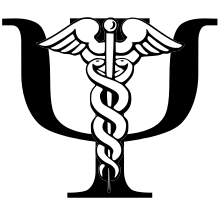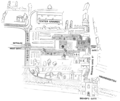Portal:Psychiatry
The Psychiatry Portal Psychiatry is the medical specialty devoted to the diagnosis, prevention, and treatment of deleterious mental conditions. These include various matters related to mood, behaviour, cognition, perceptions, and emotions. Initial psychiatric assessment of a person begins with creating a case history and conducting a mental status examination. Physical examinations, psychological tests, and laboratory tests may be conducted. On occasion, neuroimaging or other neurophysiological studies are performed. Mental disorders are diagnosed in accordance with diagnostic manuals such as the International Classification of Diseases (ICD), edited by the World Health Organization (WHO), and the Diagnostic and Statistical Manual of Mental Disorders (DSM), published by the American Psychiatric Association (APA). The fifth edition of the DSM (DSM-5), published in May 2013, reorganized the categories of disorders and added newer information and insights consistent with current research. Treatment may include psychotropics (psychiatric medicines) and psychotherapy, and also other modalities such as assertive community treatment, community reinforcement, substance-abuse treatment, and supported employment. Treatment may be delivered on an inpatient or outpatient basis, depending on the severity of functional impairment or risk to the individual or community. Research within psychiatry is conducted on an interdisciplinary basis with other professionals, such as epidemiologists, nurses, social workers, occupational therapists, and clinical psychologists. (Full article...) Selected article Tourette's was once considered a rare and bizarre syndrome, most often associated with the exclamation of obscene words or socially inappropriate and derogatory remarks (coprolalia), but this symptom is present in only a small minority of people with Tourette's. Tourette's is no longer considered a rare condition, but it is not always correctly identified because most cases are mild and the severity of tics decreases for most children as they pass through adolescence. Between 0.4% and 3.8% of children ages 5 to 18 may have Tourette's; the prevalence of other tic disorders in school-age children is higher, with the more common tics of eye blinking, coughing, throat clearing, sniffing, and facial movements. Extreme Tourette's in adulthood is a rarity, and Tourette's does not adversely affect intelligence or life expectancy. (Full article...) Selected image A human skull mapped according to phrenology (1883), early precursor to modern psychiatry and neuroscience, now considered a pseudoscience image credit: public domain
WikiProjectsSelected biography The central concept of analytical psychology is individuation—the psychological process of integrating the opposites, including the conscious with the unconscious, while still maintaining their relative autonomy. Jung considered individuation to be the central process of human development. Jung created some of the best known psychological concepts, including the archetype, the collective unconscious, the complex, and synchronicity. The Myers-Briggs Type Indicator (MBTI), a popular psychometric instrument, was developed from Jung's theory of psychological types. Jung saw the human psyche as "by nature religious" and made this religiousness the focus of his explorations. Jung is one of the best known contemporary contributors to dream analysis and symbolization. Though he was a practising clinician and considered himself to be a scientist, much of his life's work was spent exploring tangential areas such as Eastern and Western philosophy, alchemy, astrology, and sociology, as well as literature and the arts. Jung's interest in philosophy and the occult led many to view him as a mystic, although his ambition was to be seen as a man of science. His influence on popular psychology, the "psychologization of religion", spirituality and the New Age movement has been immense. (Full article...) General imagesThe following are images from various psychiatry-related articles on Wikipedia.
Related portalsTopicsSubcategoriesAssociated WikimediaThe following Wikimedia Foundation sister projects provide more on this subject:
Discover Wikipedia using portals |

































